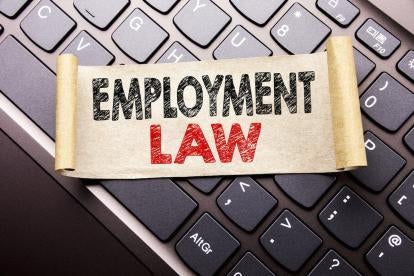This Employment Law This Week® Monthly Rundown discusses the most important developments for employers heading into January 2020. The episode includes:
1. The Recalibration of Federal Agencies
The year 2019 was the year of the “reset” button, where the regulatory agencies rolled back Obama-era positions on controversial issues, like overtime pay and joint employment. New joint-employer rules are expected any day, and the National Labor Relations Board (“NLRB” or “Board”), in particular, was very active at the end of the year, with decisions reversing Purple Communications’ holding allowing the use of company email systems for union activity, the Board’s holdings prohibiting confidentiality requirements for investigations, proposed changes to the “quickie election” rules, and more. The year 2020 brings with it an opportunity for the NLRB, Equal Employment Opportunity Commission, and Department of Labor to move on to bigger-picture thinking about priorities in the Trump administration. The General Counsel of the NLRB signaled this kind of philosophical thinking with his movement on neutrality agreements.
"These [neutrality] agreements really are a one-sided agreement that silences the employer while allowing the union to organize. In this particular case, the General Counsel overruled the local regional director's decision to dismiss an unfair labor practice charge filed by an employee contesting the neutrality agreement and the imposition of the union without a secret ballot election. If the Board were able to have this case come to fruition and we were to get a precedent-setting Board decision on whether neutrality agreements are valid, it would have a really large impact on what has been the current trend of organized labor to try to unionize new employees." —Adam Abrahms, Member of the Firm, Epstein Becker Green
Click here for more information
2. Marijuana Legalization Spreads Across the Country
Marijuana legalization is on the march. Illinois is now the 11th state to legalize recreational marijuana. As such, Illinois employers should review their drug-testing policies and procedures to comply with the unique requirements. Florida, Indiana, and Massachusetts are just a few states considering bills prohibiting discrimination against medical marijuana users, and New York and New Jersey could become the next two states to legalize marijuana for recreational use. On the federal level, two bills made strides in the House that would bolster state marijuana laws—one that would protect banks that provide services to cannabis businesses, and one that would stop the Department of Justice from using appropriated funds to interfere with state marijuana programs.
Click here for more information.
3. The Changing Nature of Work
The “gig economy,” technology, and the #MeToo movement are driving change in the way we work. In 2019, we saw aggressive regulatory efforts in worker classification, data privacy, and equal pay as states worked to grapple with these issues. On the federal level, the ongoing battle over EEO-1 data collection underscores how fundamental conflicts over technology can drive conversations about equality as regulators race to catch up to the changing paradigm. In 2020, employers and regulators alike are setting their sights on artificial intelligence (“AI”) technology, which is poised for integration into all kinds of business functions, including employment. Matthew Savage Aibel, Associate at Epstein Becker Green, explains how employers are using facial recognition AI technology in hiring:
"Employers are using facial recognition technology in a variety of ways. First and foremost, they're using it for video interviews, which is also known as emotion sensory analysis or facial analysis. Employers are then using AI software to analyze candidates' facial expressions in their recorded answers. Facial recognition technology is also used by companies for security purposes, both data and physical. Lastly, employers are using facial recognition technology in lieu of traditional time clocks."
4. Tip of the Week
The changing nature of work requires some fundamental shifts in the structure and culture of our workplaces. Erica Volini, Deloitte Global Human Capital leader, continues our look ahead with tips for employers as they prepare for the future of work:
"In order to tackle the future of work, organizations need to look into the future or zoom out. And we're not talking about the next 12 to 18 months; we're talking about looking at the next three, five, even 10 years to reimagine, what is the work going to be moving forward and what are the new outcomes that organizations need to tackle? And based on that re-imagination of the work, what is the composition of the workforce that's needed, and how do we change the policies, the programs, and the processes designed to support that workforce? And that can't be done by HR alone. We need HR, legal, finance, and IT to be working together in concert to help make the changes that are required, and help the organization get prepared for the work of the future."




 i
i


